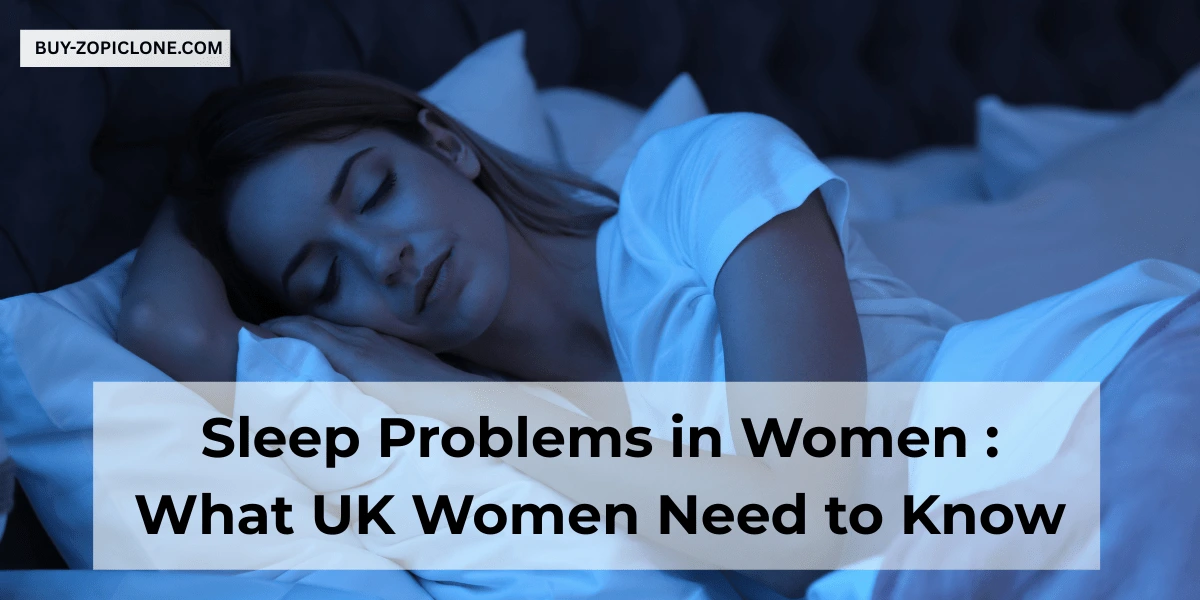Sleep Problems in Women: What UK Women Need to Know

If you are a woman above 40 living in the UK and finding it hard to sleep, you are not alone. In general, women report an increased need for sleep than men and are more sensitive to disruptions in sleep patterns, and the situation in the UK is no different. One out of four people in the UK suffer from sleep problems, among which the majority are women.
A sleep review paper has suggested that almost 43% of British women complain of insufficient sleep, while 48% don't feel rested when they wake up. Women have more trouble sleeping than men, wake up more during the night, and are not able to go back to sleep, subsequently feeling more irritable during the day because of the disturbed sleep. The problem is exacerbated as they approach their 40s because of a combination of lifestyle factors, changes in sleep architecture, and hormonal changes.
Why Women Over 40 Struggle With Sleep
women over 40 are subjected to a decline in estrogen and progesterone levels, resulting in changes in skin and muscle mass coupled with negative changes in lipid profiles. In addition, loss of estrogen disrupts sleep quality, leading to insomnia and other sleep disorders.Research has shown that estrogen influences neurotransmitters like norepinephrine, serotonin, and acetylcholine, which play an important role in calming the nervous system and work as a neurotransmitter and neuromodulator, influencing cortical activity and influencing the sleep-wake cycle. Consequently, a decrease in estrogen levels disrupts their balance, interrupting the sleep cycles and making it difficult to fall or stay asleep.
One of the biggest sleep disruptors during menopause are hot flashes and night sweats. It is estrogen that regulates the body's temperature. When the estrogen levels fall during menopause, the hypothalamus ( the heat regulator of the brain ), becomes sensitive to temperature changes, resulting in excessive sweating and hot flashes.An often overlooked factor is estrogen's role in mood regulation and the brain's response to anxiety and fear. Estrogen regulates the brain's fear response and plays an important role in modulating anxiety-related behaviors by influencing serotonin neurotransmitters involved in mood and modulating the hypothalamic-pituitary-adrenal axis involved in stress response.During menopause, the decline in estrogen impacts neurotransmitter modulation, resulting in anxiety, irritability, and mood disturbances that make it difficult to drowse off or have a restful night's sleep.
Common Sleep Disorders in Midlife Women
Insomnia impacts 50% of women post-menopause, resulting in sleep disturbances, especially waking up mid-sleep at night. Results from a British Prospective Cohort Study have shown that 43% in the UK have trouble sleeping. In a study conducted on 8580 adults living in England, Scotland, and Wales, 37% reported insomnia,12% reported moderate insomnia, 13% reported insomnia with fatigue. all of the individuals reported stress and public consciousness because of their sleep difficulties.A primary cause of insomnia is often attributed to sleep-disordered breathing, which leads to sleep fragmentation and hampers their day-to-day living.
Menopause is often associated with weight gain, particularly around the abdominal area, narrowing the airways and increasing the risk of Sleep Disordered Breathing.Additionally, estrogen and progesterone depletion cause breathing difficulties. It is important to understand that both estrogen and progesterone are respiratory stimulants. Progesterone acts as a natural respiratory stimulant and helps maintain steady breathing by keeping the upper airway muscles toned. Estrogen influences the immune response in the airways and supports the stability of airway tissues to support breathing.
Consequently, their depletion pre or post-menopause results in interrupted breathing during sleep and disturbs sleep patterns, paving the way for morning fatigue, loss of focus and concentration, and increased risk of heart disease.
Other Causes of Poor Sleep in Women
Other than SLB, Restless Legs Syndrome (characterized by an irresistible urge to move the legs that worsens at night ), results in difficulty falling and staying asleep.Restless Legs Syndrome can be a combination of genetic and environmental factors and sometimes a result of dopamine dysfunction, anemia, or iron deficiency.
RLS is also related to dysfunction in the basal ganglia, a part of the brain using dopamine to control movement. Consequently, dopamine disruption results in involuntary movements, resulting in the urge to move when sitting or lying down, especially at night.Despite being associated with night-time, the impacts of RLS gradually seep into daytime because the patient wakes up refreshed, irritable, and fatigued.There are other causes of poor sleep caused by lifestyle factors, medications, or chronic conditions like bladder problems, resulting in sleep fragmentation and cognitive difficulties.
Health Consequences of Poor Sleep
Among the direct consequences of poor sleep are mood swings, brain fog, and impact on memory.
Sleep is crucial for learning and memory. Disturbed sleep is associated with impaired attention and executive functioning. Sleep problems are common in menopausal women that continue till advanced age and are the leading causes behind cognitive decline and dementia.Studies have even shown long-term sleep problems linked to reduced grey matter volume ( involved in learning, memory, language, and decision-making) and compromised white matter integrity ( forming the infrastructure for cognitive networks ), resulting in noticeable declines in long and short-term memory, verbal fluency, reasoning, attention, and focus.
Other than cognitive impairment, sleep deficit is associated with heart health risks. The American College of Cardiology, in a paper, has hypothesized that people getting five or fewer hours of sleep a night are 1.38 times and 1.56 times more likely to experience a heart attack than people getting five or six hours a night, and the risk is particularly high for women.It has been hypothesized that sleep problems trigger the body's stress response, releasing hormones that elevate blood pressure and heart rate. Myocardial Infarction and sleep disturbance share many risk factors, including inflammation, with women being more at risk than men.
Studies have shown that women sleeping five hours or less had significantly higher hs-CRP levels and women getting 8 hours of sleep had 11% lower IL-6 levels compared to those who slept 7 hours, suggesting that longer sleep was important for the heart health of women.Sleep plays a crucial role in the well-being of individuals. Lower sleep and poor sleep hygiene can impact immune function, and women are particularly susceptible to the risk. Recent research has demonstrated that sleep plays an important role in regulating the gut biome that influences immune homeostasis.
Because of hormone fluctuation or other physiological differences, women are more susceptible to sleep loss than men, which impacts their cognitive health, heart function, and systemic immunity.
Practical Sleep Hygiene Tips That Actually Work
Inadequate Sleep hygiene is responsible for almost 55.5% of sleep problems, as per a study, and is one of the contributing factors for excessive daytime sleepiness that accumulates into frequent mistakes at work, contributes to car accidents, and reduces the overall productivity of the individual. Studies have shown that incorporating sleep hygiene practices can be beneficial in restoring sleep architecture and getting your productivity back. Some of them are are
Maintaining a Consistent Sleep Schedule
getting ready for sleep and waking up at consistent timings, trains your body's internal clock and makes it easier to fall asleep and wake up at desired times.
Optimizing Sleep Environment
There are a number of ways in which you can optimize your sleep environment.
- Creating a dark space by wearing eye masks, using black-out curtains
- Minimizing noise by using earplugs, choosing a sleeping area away from noisy areas like streets or hallways
- Maintaining a cool room temperature in between 60 to 67 Fahrenheit
- Ensuring your bedding is comfortable and clean
- Keeping bedroom uncluttered
- Using comfortable and breathable sleepwear
Avoiding Caffeine
Avoid Caffeine before bedtime. If you are sensitive to its effects, avoid it even earlier in the day or limit your intake altogether.
Exercising Regularly
Regular exercise keeps away the abdominal fat blocking the airways and promotes a boost of melatonin, the sleep hormone. Aim for at least 30 minutes of moderate-intensity aerobic activity regularly stick to the routine.
Talking to a Medical Professional
A medical professional can help rule out any underlying conditions and help restore sleep.
When to Seek Professional Help
According to a journal published by Dukehealth, if your sleep problems last for more than three months and make you feel exhausted during the day or affect your day-to-day activities, then you should speak to your GP.
CBT-1 ( Cognitive Behavioral Therapy )
CBT-1 aims to improve sleep quality by addressing underlying thoughts, behaviors, and habits that are disturbing your sleep patterns. It further helps you repair your sleep architecture through sleep education and cognitive and behavioral therapy.
Medication
Medications help you fall asleep quickly, have a peaceful sleep phase without any night-time awakenings, and have a restful night's sleep that increases your following day's productivity.
HRT ( Hormone Replacement Therapy )
Hormone Replacement Therapy is an effective option for restoring sleep quality in women, particularly those experiencing menopausal insomnia due to estrogen deficiency. It is especially useful in reducing the severity and frequency of hot flashes and night sweats that make it difficult to sleep.
Conclusion:
Sleep problems are common in women in the UK, especially those nearing or in their 40s. While menopausal changes and hormonal transitions are the major causative agents, lifestyle, health conditions, and stress further exacerbate it. Being aware of the problems associated with it and getting timely help can help restore sleep balance successfully.
In the UK, Almost Half of Women Not Getting Enough Sleep
Unique Aspects of Sleep in Women - PMC.
Ageing and Hormones in Women Over 40 | Echelon Health.
Estrogen Receptors Modulation of Anxiety-Like Behavior - PubMed.
https://pubmed.ncbi.nlm.nih.gov/16809931/
https://pmc.ncbi.nlm.nih.gov/articles/PMC3267631/
Sleep and mild cognitive impairment.
Sleep disorders and cognitive alterations in women - ScienceDirect.
https://pubmed.ncbi.nlm.nih.gov/19639748/
https://pmc.ncbi.nlm.nih.gov/articles/PMC11559494/#bibr14-09727531241275347
https://link.springer.com/article/10.1007/s12529-023-10212-y
Please log in to add a comment.
Popular Posts
Sleep Problems in Women: What UK Women Need to Know
How to handle not being able to sleep in UK
Managing Stress and Insomnia with Zopiclone Tablets: A Guide 2025
Zopiclone Withdrawal Symptoms, How to Manage Them
Chronic Insomnia? Here's How Zopiclone Can Help (A Safe Guide)
Is Zolpidem Better Than Zopiclone in the UK? A Comprehensive Comparison
Buy Zopiclone in London: NEXT-DAY Delivery for Better Sleep
Zopiclone mixed with alcohol and other drugs
Our Popular Treatments

Dr. Kelly
Introduce yourself to Dr. Kelly, a distinguished figure in the medical profession. The passion for healthcare and the invaluable knowledge of Dr. Kelly, despite his retirement from active clinical practice, remain as vibrant as ever. He now focuses his extensive 20-year medical experience on our pharmacy's blog, thereby supporting our mission to educate and empower our valued customers.
.svg)
Delivered in secure, plain packaging on fully tracked delivery from just £10.

Our team of doctors and pharmacists, and our support staff, are all UK-based.
.svg)
Have a question? Telephone support is always free; Monday - Friday, 9am - 5pm.

Comments........!